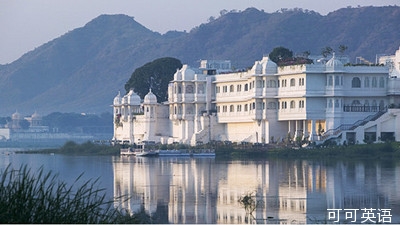商业报道
Taj Hotels and Orient-Express
泰姬陵酒店和Orient-Express酒店
Disorientation
迷途羔羊
Two luxury hotel chains will not be checking in together
两家奢侈连锁酒店将无法一同腾飞
INDIA and Orient-Express have never rubbed along.
印度和Orient-Express酒店一直很融洽。
The luxury hotel firm's buccaneering founder, James Sherwood, visited the country in the early 1990s and had a nightmare.
James Sherwood在20世纪90年代早期游玩过印度,投机性地建立了这家奢侈酒店,也经历了一场噩梦。
His private jet was delayed for an age in Mumbai while officials checked that the bottles in its on-board bar were sealed correctly.
当时地方官员检查他私人飞机上酒吧的酒瓶是否正确密封花了很长时间,导致航班在孟买延误了很久。
He signed a deal to run the Lake Palace Hotel in Rajasthan, owned by local royalty.
在此期间,他签了一份经营碧河皇宫酒店的协议,这家酒店位于拉贾斯坦邦,所有权归当地贵族。
 The deal collapsed when lawyers discovered that Mr Sherwood's interlocutor was not the real Maharana of Udaipur, but his brother.
The deal collapsed when lawyers discovered that Mr Sherwood's interlocutor was not the real Maharana of Udaipur, but his brother.
但协议很快终止了,律师发现Sherwood的合作者不是真正的乌代浦尔的王公贵族,他的哥哥才是。
TheLakePalacewas run then, and still is, by Taj Hotels.
随后,泰姬陵酒店将碧河皇宫酒店一直运营到现在。
It is part of Tata Sons,India's biggest conglomerate.
它现在是印度最大的企业塔塔之子旗下的产业。
For the past half-decade Taj has fantasised about swallowing its American-listed rival.
过去五年里,泰姬陵酒店一直幻想着吞并这位美国的竞争对手。
In 2007 it took a stake in Orient; it owns 6.9% today.
2007年,它入股Orient酒店,现在已经有6.9%的股份了。
In 2012 it made a takeover bid valuing Orient's equity at 1.3 billion.
2012年,泰姬陵酒店采取了收购行动,想以13亿美元购买Orient酒店的资产。
Orient dismissed this as one of its guests might a bell hop, arguing it was too low. On November 8th the Indian firm abandoned its pursuit.
Orient酒店就像一位客人拒绝门童那样拒绝了这次收购,宣称价格太低。11月8号,这家印度企业终止了收购行动。
Orient has 45 trophy properties including the Hotel Cipriani inVeniceand theCopacabanaPalaceinRio de Janeiro.
Orient酒店有45家著名产业,其中包括威尼斯西普利亚尼宾馆和里约热内卢科帕卡巴纳沙滩酒店。
Most were acquired after years of negotiation by Mr Sherwood, who retired as chairman in 2007.
大部分产业都是Sherwood花费了数年时间谈判获得的,他也于2007年从主席位置退休。
A glorious symbol of extravagance, the firm entered the global financial crisis with too much debt.
Orient铺张浪费的光荣象征导致它带着巨大债务卷入了全球金融危机里。
As profits collapsed it barely survived and its market capitalisation dropped to 144m at the low point.
随着盈利巨跌,它只能勉强维持经营,市场资本也跌至1.44亿美元的低位。
Since then it has been groping its way back to financial health.
从那以后,它就一直探索让它恢复金融常态的方法。
The Taj bid speeded that process.
泰姬陵酒店对它的收购加快了这一进程。
Days after it was made in October 2012, Orient appointed a new boss, John Scott.
仅在泰姬陵酒店2012年10月份做出收购决定的几天后,Orient认命了一位新总裁,John Scott。
The firm has cut costs and sold assets.
随后公司削减开支,变卖资产。
Its market capitalisation has recovered smartly to 1.5 billion—above the Taj bid, although some way off the 2.7 billion valuation it enjoyed at the peak.
市场资本漂亮地恢复到15亿美元,尽管离它27亿美元的顶峰时期价值还有一段距离,但还是高于泰姬陵酒店的提价。
For Taj life has got harder.
泰姬陵酒店的生意也不好做。
It is now the smaller of the two firms, with a market cap of only 600m, from a peak of 2.6 billion.
现在它是两家企业中较弱的一方,市场资本只有6亿美元,远逊于顶峰26亿。
It is losing money and is almost as leveraged as Orient was at its nadir, measured by net debt relative to gross operating profits.
通过计算与总营业额相关的净资产判断,泰姬陵酒店一直在亏损财力,和Orient处于低谷时期几乎一样受到杠杆作用影响。
The boom inIndiahas faded.
印度的繁荣已经衰落。
Intense competition from global chains has lowered room rates.
全球连锁酒店业激烈的竞争降低了房间价格。
Taj's adventures inAmerica—it owns The Pierre inNew York, for example—have also strained its finances.
以纽约的皮埃尔酒店为例子—它是泰姬陵酒店在美国投资的公司,也在缩小规模。
Taj could not have made the 2012 bid without help from its parent group.
2012年的那项收购计划,没有背后主公司的帮助,泰姬陵酒店是无法提出的。
It also roped in a minority partner, a fund linked to Luca di Montezemolo, the chairman of Ferrari.
它也游说到了一个少数派合作伙伴给它供应资金——法拉利公司的主席卢卡·迪·蒙特泽莫罗。
Perhaps Tata's new boss, Cyrus Mistry, who took over from the patriarch Ratan Tata at the end of 2012, has taken a tougher stance.
在2012年年底从元老Ratan Tata那接手塔塔之子集团,成为了新老板的Cyrus Mistry可能已经采取了更加强硬地立场。
About two-thirds of the capital employed in the wider Tata group is making a post-tax return on capital of 10% or less, according to calculations by The Economist.
根据经济学人的计算,塔塔之子集团内2/3的资本在税后的资本返还率为10%或者更少。
Taj hotels is a small part of this underperformance but Mr Mistry may have insisted that it gets its own house in order before it does any more empire-building.
泰姬陵酒店只是塔塔集团弱势股的一小部分,在Mistry进行构建更大的商业帝国前,他可能还会坚持让它管理好它自己的房产。
Just as Taj's problem may in part have been a forgiving controlling shareholder, Orient has also been insulated from shareholders' wrath.
正如泰姬陵酒店出现的问题一部分是出自宽容的有控制权的股东身上,Orient酒店却和股东的怒火不沾边。
Its B shares act as a poison-pill structure that puts voting control in the hands of the firm, not its owners.
它的B级股票就像一片毒药,把投票权给公司,而不是给拥有者。
As both firms have battled the business climate and each other, they have missed a half-decade of change in the industry.
两家公司都在和商业环境作斗争,互相之间也在做斗争,它们很盼望像工业五年变革的一场改变。
Global hoteliers such as Starwood and InterContinental have performed far better.
像Starwood和InterContinental这样的全球酒店运营商的经营就远远好于它们。
They have asset light business models, in which they merely manage hotels rather than owning them.
运营商们有一套轻资产上阵的商业模式,这样运营商只用管理酒店而不是拥有它们。
They have multiple brands aimed at different kinds of customers.
针对不同的消费者们,他们也有多种品牌策略。
Taj has experimented with this approach but has been timid, and Orient-Express is still an old-school affair.
泰姬陵酒店也尝试过这种方法,但是尺度很小,Orient-Express却还是一副老学究作态。
Both hotel groups specialise in historic buildings that are lovingly maintained.
两家酒店集团专门经营被小心保存的历史建筑。
Both need to do more to avoid becoming ancient monuments themselves.
但是两家酒店都需要做的更多,避免像这些历史建筑一样成为远古遗迹。
 The deal collapsed when lawyers discovered that Mr Sherwood's interlocutor was not the real Maharana of Udaipur, but his brother.
The deal collapsed when lawyers discovered that Mr Sherwood's interlocutor was not the real Maharana of Udaipur, but his brother.
 The deal collapsed when lawyers discovered that Mr Sherwood's interlocutor was not the real Maharana of Udaipur, but his brother.
The deal collapsed when lawyers discovered that Mr Sherwood's interlocutor was not the real Maharana of Udaipur, but his brother.